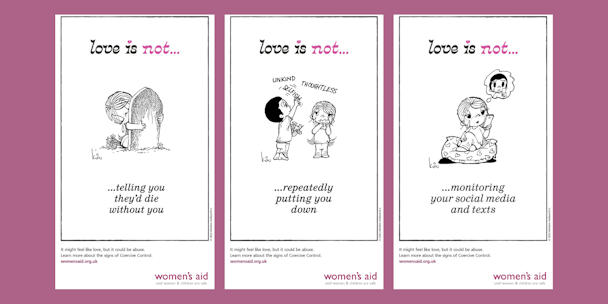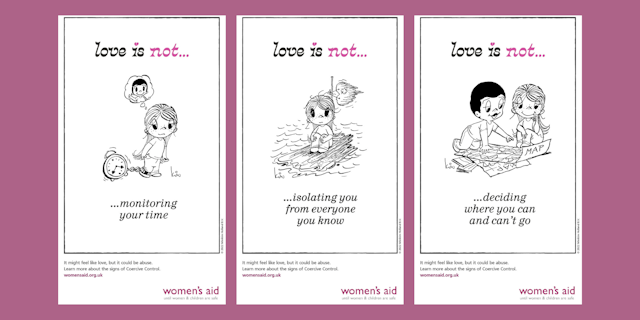Women’s Aid shows what love is not in subversive Valentine’s Day campaign
At a time of the year when romantic relationships are top of mind, Women’s Aid wants to disrupt people’s expectations of Valentine’s Day to teach them about the signs of unhealthy relationships and coercive control.

The ‘Love Is…’ illustrations were originally created by New Zealand cartoonist Kim Grove in the 1960s
Based on the insight that over a third of teenage girls had been in abusive relationships and that more than a half of them don’t even realize it, Engine Creative has worked pro bono with Women’s Aid to create a DOOH and social Valentine’s campaign.
It is built on the idea that many people mistake controlling behaviors in their relationships for love – as captured by its take on the ‘Love Is’ motifs and use of traditional Valentine’s imagery and typography, but with messages that encourage the audience to question what is really healthy.
The ‘Love Is…’ illustrations were originally created by New Zealand cartoonist Kim Grove in the 1960s and originated from a series of love notes that Grove drew for her future husband, Roberto Casali.

Engine’s creative director Christopher Ringsell explained: “These playful but hard-hitting executions illustrate what love is not… After all, love does not mean repeatedly putting you down, telling you they’d die without you or controlling where you are. We were honored to bring the iconic ‘Love is…’ illustrative brand back this Valentine’s Day, but with a new twist. These cartoons have been adored for decades; by subverting them, we are able to provide a simple way to educate audiences about coercive control.”
Despite a successful Women’s Aid campaign in December 2015 making it illegal, records of coercive control offences have been steadily rising. Police recorded 24,856 coercive control offences in England and Wales in the year ending March 2020 – a huge rise of more than 50% from the previous year. Furthermore, the pandemic has only exacerbated the problem and within the first two weeks of lockdown alone there was a 41% increase in users visiting the Women’s Aid Live Chat site to seek help on the issue.
Research by Women’s Aid and Cosmopolitan in 2019 found that over a third of teenage girls had been in abusive relationships and, more shocking still, when the remaining two thirds were asked about their relationships, 64% had been in abusive relationships without even realizing it.
Farah Nazeer, chief executive of Women’s Aid, said: “This campaign helps spread the vital message that many behaviors commonly perceived to be romantic – such as jealousy, demanding constant contact and somebody wanting you all to themselves – are actually dangerous.
“Domestic abuse isn’t just physical: perpetrators use controlling behavior to make a person dependent by isolating them from support, exploiting them, depriving them of independence and regulating their everyday behavior. Coercive control creates invisible chains and a sense of fear that pervades all elements of a survivor’s life. Women’s Aid will challenge this abuse, help survivors recognize it and continue to transform the lives of so many women.”

